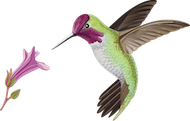Tule elk, kit fox and horned owls, oh my! Three places to spot animals in California
Here are three open spaces where you can spot animals while remaining socially distanced from others.
Arctic Wildlife Are Shifting Their Behaviors Due to Climate Change
The new, collaborative data archive tracks nearly 100 species over the last three decades
Seeing Clouds Clearly: Are They Cooling Us Down or Heating Us Up?
Though scientists know that clouds are critical to the climate system, their exact role is still uncertain. New studies are starting to fill in the knowledge gap.
On Birds and Belonging
Growing up in the Philippines, Justine Villanueva shares her journey of leaving her homeland and healing her belonging through decolonization, learning to dwell, and connecting to birds.
Requiem for Lost Plants
Requiem for Lost Plants aims to shine a light on how whole ecological communities have been uprooted without acknowledgement as a result of the colonization and urbanization of Tongva, Chumash, and Kizh land in Los Angeles.
As crises collide, can California meet its climate goals?
Against a backdrop of rising environmental anxiety, with wildfires lasting longer, spreading further and damaging more acreage and communities than ever before, the pandemic triggered a sharp recession and spike in unemployment.
An Indigenous Effort to Return Condors to the Pacific Northwest Nears Its Goal
The Yurok Tribe plans to soon reintroduce North America’s largest bird to northern California, where the raptor hasn’t soared for a century.
New Tea Tree Oil Fungicide Becomes Available for California Growers
A new tea tree oil fungicide is now available to California growers after hitting the market a few weeks ago. Summit Agro’s Timerex Act was officially registered in California in the middle of October. The new fungicide is available for a variety of different crops. Summit Agro Field R&D Manager, Eric Tedford said that it is a pretty unique chemistry that can offer a variety of benefits.
Hardcore Natural History Series — Small But Mighty: Monarch Butterfly Migration and Overwintering with Jessica Griffiths
Every fall, thousands of monarch butterflies migrate to Monterey County from all across the western United States to spend the winter clustering together at special overwintering sites. But how do they get here?
To save threatened plants and animals, restore habitat on farms, ranches and other working lands
Restoring native habitats to at least 20% of the world’s land currently being used by humans for farming, ranching and forestry is necessary to protect biodiversity and slow species loss, according to a newly published study conducted by a team of environmental scientists including us.

